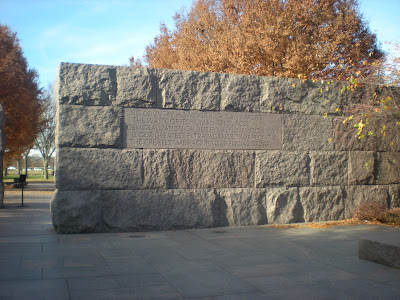While we were in Washington D.C. last week, we went to see the Franklin D. Roosevelt monument. Though I'd seen some pictures, I'd specifically avoided too much advance looking. I'm a Roosevelt admirer of the first order and I wanted to see the monument in real time.
It didn't disappoint.
In addition to statues and waterfalls, the monument features Roosevelt's words. They are powerful ideas.
This wall reads: "In these days of difficulty, we Americans everywhere must and shall choose the path of social justice, the path of faith, the path of hope, and the path of love toward our fellow man."
FDR looked for solutions to poverty and inequality, problems we still struggle to solve.
The words next to the men waiting in line for food read, "The test of our progress is not whether we add more to the abundance of those who have much, it is whether we provide enough for those who have too little."
As Congress refuses to address the unemployment problem in this nation, we can look to FDR for condemnation of our failure to take action, "No country, however rich, can afford the waste of its human resources. Demoralization caused by vast unemployment is our greatest extravagance. Morally, it is the greatest menace to our social order."
As we keep open the prison at Guantanamo Bay and evict Occupy Wall Street protesters, President Roosevelt reminds us of the importance of civil rights: "We must scrupulously guard the civil rights and civil liberties of all citizens, whatever their background. We must remember that any oppression, any injustice, any hatred, is a wedge designed to attack civilization."
He reminds us of the horrors of war, "I have seen war on land and sea. I have seen blood running from the wounder. I have seen the dead in the mud. I have seen cities destroyed. I have seen children starving. I have seen the agony of mother's and wives. I HATE WAR."
President Roosevelt knew that we need to steward our natural world, "men and nature must work hand in hand. The throwing out of balance of the resources of nature throws out of balance the lives of men."
Everywhere you turn in this memorial is a reminder of the ideas that saved our nation in the Great Depression and WWII. The ideas are as powerful as they are timeless. I wish I could say that I found this all hopeful, but I didn't. I found it frustrating. There was a time when our challenges were great, greater than they are today. As a nation, we organized and took action; we looked after one another. We were better for it. Today, we know the answers to our problems; history and Roosevelt could be our guide. And yet we refuse to act.








1 comment:
Preach on, sister. All these D.C. posts are giving me a hankerin' for a trip East.
Post a Comment